The rise of tech-savvy CMOs is an ominous sign of how quickly marketing teams are adopting new technologies to fine-tune business decisions. Technology in marketing campaigns drives brand awareness and keeps CMOs accountable, enabling them to focus on strategic business goals rather than spending (unprofitable) attention over silos. While digital marketing in 2005-2015 was largely confined to B2C and e-commerce, the latest statistics on marketing automation reveal how quickly B2B marketing professionals are inflating their budgets to automate omnichannel platforms.
An indispensable trend seen in digital marketing is the increase in its budgets. Gartner’s CMO Spend Survey 2015-16 reports the swelling of digital marketing budgets by 33% in 2017, whereas overall marketing budgets will increase by a mere 12% during the same period. The move from conventional advertising to digital could reach its tipping point in 2017 as marketing budgets of most firms would see an escalation in their spending on marketing technology, especially as more non-tech companies adopt mobile-first marketing as their priority.
This article is a quick read covering five marketing technologies that CMOs prefer to invest in –
- Marketing Automation
- Omnichannel Marketing
- Analytics and Tracking
- Optimization and Conversion
- Programmatic
Marketing Automation
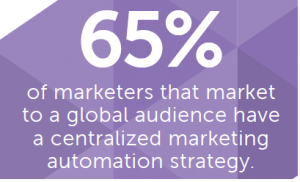
Marketing technologies delivered from the cloud is replacing software at a breakneck pace. The success of any digital marketing campaign is judged from the extent of its automation capabilities. Marketing automation used in B2B and B2C enterprises prove vital in enterprise content and digital assets management.
Providers like Hubspot, Salesforce, and Marketo help marketers reorganize their lead-gen, customer segmentation, prospect nurturing and lead scoring, customer LTV, cross-channel marketing and brand engagement strategies to extract maximum ROI. Most B2B companies are currently using marketing automation with an objective to manage their entire digital presence across channels.
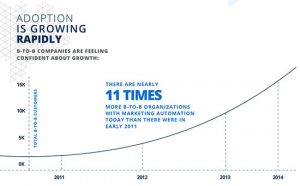
The trend of increasing spending on digital marketing automation allows marketers to explore other options that offer scalable marketing automation for SMBs and start-ups. Like Lego blocks, marketing automation can be assembled and scaled at will, allowing marketers to assiduously manage and optimize data, information, and knowledge over a centralized platform.
Omnichannel Marketing
“You’ve got to start with the customer experience and work back toward the technology, not the other way around.” – Steve Jobs
Customer experience or CX is the most powerful revenue-churner, and therefore the most sought-after objective of every CMO. According to a Walker study, CX will overtake price and product as the key brand differentiator by 2020. According to the survey, 86% customers are ready to pay more for CX than other product features!
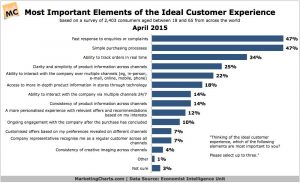
CMOs refer to omnichannel as the holy grail of every marketing campaign, leading to seamless CX, regardless of the number and type of devices they use. The ability to leverage omnichannel technology ensures that the brand’s message is seamlessly delivered on desktop laptop tablet or smartphone or through a catalog or in a brick and mortar store. Location based services also tie in with this as smartphones would enable users to tag their whereabouts and brands could use this to send customized offers and services to such consumers.
Analytics and Tracking
Not everything that can be counted counts and not everything that counts can be counted. The essence of adopting analytics and tracking technology in marketing lies in its freedom of application. As the most populated technology of digital marketing, analytics allow marketers turn insights from scrambled data into ROI-driven actionable results. Online and offline tracking of customer behavior analytics extracts the most out of your market research based on geo-location tracking, user-list targeting, and top-search inventories.
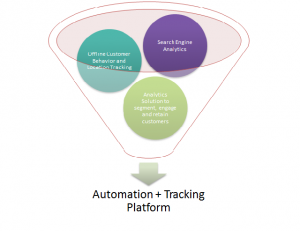
The most challenging part of deploying tracking and analytics technology is its ambiguity in delivering ROI. Though marketing attribution modeling attempts to solve this gap, lack of integration between channels like social media and community building with CRM makes it hard to identify the first-touch platform.
Marketers are expected to spend over 11% of their budgets on digital marketing but only 22% of marketers said that they had data-driven (analytics) marketing initiatives that were showing significant results. Some marketers have also said that they were unable to clearly calculate a return on investment for their digital marketing programs. Integration with legacy systems and the ability to produce customer centric date would drive this market. The wide variety of analytics data options in the market means that CMOs would have to be discerning in their choice and fully test a solution before deploying it.
Optimization and Conversion
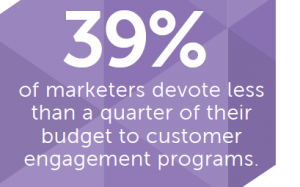
Digital optimization and conversion are the techniques to convert online visitors into loyal customers. The theories of digital optimization have been revised over the years and with the rise of online marketplaces, many firms have rolled out software that deals with this. Most firms are looking at conversion rates as online advertising is still in PPC or CPC. Firms are looking to leverage their online marketing spends by seeking solutions and combining their marketing approaches for an integrated campaign that ensures that highest visibility and conversion rates.
Firms are looking to leverage their online marketing spends by seeking solutions and combining their marketing approaches for an integrated campaign that ensures that highest visibility and conversion rates.
Programmatic
Programmatic real-time bidding (RTB), done for display advertising exclusively, is the future of all advertising. Simply put – programmatic marketing empower marketers and advertisers to pay only for highly effective ads, delivering the right message to the right set of customers at the right time. Marketers are adopting programmatic to target segmented audiences with specific advertisements, limiting the ad spend to drive maximum ROI. Programmatic platforms running on adaptive algorithms help analyze data and in real-time, canvassing fully-personalized ad experience across multiple screens. Sales partners can also leverage digital inventory advocating B2B programmatic commerce. Programmatic-as-a-platform and programmatic-as-a-solution allow marketers and advertisers to bridge gaps in “brand awareness”, targeting audience at scale at much lower ad spend using classical audience extension as well as account-based data.
Sales partners can also leverage digital inventory advocating B2B programmatic commerce. Programmatic-as-a-platform and programmatic-as-a-solution will allow marketers and advertisers to bridge gaps in “brand awareness”, targeting audience at scale at much lower ad spend using classical audience extension as well as account-based data.
Supporting technologies
Marketers can grow their marketing technologies’ stack by adding technologies for remarketing, retargeting, content and social listening technologies. Artificial intelligence and Account-based marketing (ABM) are slowly galvanizing marketing automation platforms, providing CMOs a vantage point to engage thought leaders and vendors who are making the most noise. From making an effective market research to driving advocacy campaigns, ABM outperforms other marketing investments in terms of customer retention and market expansion. B2B enterprises achieve 24% faster growth in annual revenues when ABM is aligned to sales and marketing operations. Top CMOs advocate the idea of spending more on ABM in 2017, promoting it as the most vital cog in the entire marketing technologies’ stack.
Read Also: Centers of Excellence Key to Boost MarTech Adoption and Maturity
Then, there is remarketing technology. Contextual remarketing, which is used to turn one-time visitors into repeat customers, ensures that there is an increased possibility of them buying your product. Social listening is a niche field which is growing rapidly. Online reputation management based on social listening and monitoring capabilities help brands know what people think and feel about them. AI technologies with cognitive learning capabilities help manage and derive insights from the huge data pool that all the digital marketing tools generate. AI capabilities in marketing technology stack can calibrate and calculate the efficacy of such campaigns, engaging more audience over most “ideal” platforms across web, mobile and social.
Marketing Technologies removes the Guess Move in entirety
CMOs are not afraid to explore creativity in data collection and implementing ideas. Split testing and customer experience modeling ensure that digital marketing is not a standalone part of the overall marketing plan. The development, integration, and application of intelligent marketing technologies will continue to inflate in 2017. Mobile and social intelligence capabilities tagged alongside performance-based marketing would increasingly gain more attention from CMOs this year.
Read Also: How to Create a Mobile Marketing Strategy in 2017











